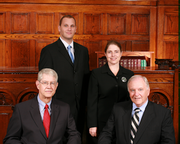An Introduction to Trusts

A trust is a type of estate planning arrangement in which you pass over ownership of a property to someone you designate. However, you retain the right to live in or use the asset until your passing. To learn more about why this is done, the guide below offers a brief explanation of the benefits.
Purposes
A trust allows your family members to avoid the long and costly process of probate. When a person dies, the terms of their will must be verified by the probate courts, but the terms of a trust are not subject to this requirement. While the assets in a will are frozen until the courts have processed them, those in the trust pass from the decedent to the beneficiary with no outside interference.
Another goal is privacy. Those who are estate planning should know that the terms of a will are matters of public record—but the details of a trust stay confidential. This can be especially helpful for estates with significant assets that do not wish to generate publicity.
Finally, a trust may save your loved ones some money. Court costs associated with probate can quickly add up. Also, a revocable living trust is taxed as trust income, not earned income, so you avoid paying estate taxes on that property.
Types & Benefits
 There are two main types of trusts—each offering specific advantages. In a revocable trust, also known as a living trust, assets are placed in the ownership of the trust when the trustor is still living, and their terms can be amended at any time; you can also name yourself trustee and retain control over the assets. In an irrevocable living trust, the terms of the trust cannot be changed.
There are two main types of trusts—each offering specific advantages. In a revocable trust, also known as a living trust, assets are placed in the ownership of the trust when the trustor is still living, and their terms can be amended at any time; you can also name yourself trustee and retain control over the assets. In an irrevocable living trust, the terms of the trust cannot be changed.
A special needs trust is a kind of irrevocable trust in which the original owners sets aside funds to care for a disabled loved one. This is especially useful since large inheritances can sometimes disqualify individuals for government support, whereas receiving the money via trust would not automatically preclude them.
How a Lawyer Can Help
In addition to offering advice over the kind of trust to establish, having a lawyer draw up your estate planning documents will ensure that all laws are adhered to and that all assets transfer smoothly upon your death. If your wishes are more complex—for example, if you would like to place conditions on the beneficiaries—an attorney can assist with that as well.
Ready to start estate planning? Turn to the attorneys at The Law Offices of Bromm, Lindahl, Freeman-Caddy & Lausterer for help with creating a trust, will, or power of attorney. Since 1893, they have been representing individuals and businesses of Saunders County, NE; their passionate efforts have since earned them an AV® Preeminent™ rating from Martindale-Hubbell. Visit them online to learn more about their practice areas. Then call (402) 443-3225 to schedule a consultation.
About the Business
(5 reviews)
Have a question? Ask the experts!
Send your question

